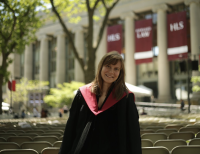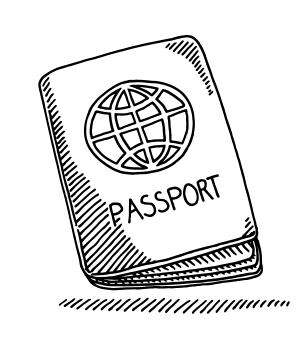
Photo credit: Himesh Kharel
Pursuing an LL.M. can be a challenging journey, filled with demanding coursework, intensive research, and the occasional bout of writer’s block.
While at Harvard Law School, I discovered a set of tools that became my trusted companions — each playing a unique role in keeping me organized, productive, and sane. Here’s what worked for me:
1. Obsidian
For the past 4 – 5 years, Obsidian has been my go-to app for all writing projects. It transformed the way I approached note-taking, drafting, and ideation.
Initially, I used Obsidian to jot down notes on books and articles I was reading for my academic work. However, over time, it became much more than a note-taking app — it became my safe haven for battling the dreaded blank screen syndrome.
The minimalist interface and my chosen gray theme made writing feel less intimidating. Unlike Word’s stark whiteness, which often felt overwhelming, Obsidian’s subdued tones created a welcoming space for creativity.
I’d often start with my notes on a book or an article I’d read, and before I knew it, I was shaping them into a first draft. This process gave me the comforting feeling that I was never starting from scratch.
Over time, this daily writing habit became second nature, and the results speak for themselves: I received the Addison Brown Award for my LLM thesis in conflict of laws and was the first of my supervisor’s PhD candidates to defend my doctoral thesis.
2. Toggl
As a former law firm associate, I once despised time tracking. But when I started using Toggl to track my personal time, it became a game-changer.
Toggl helped me understand how I was actually spending my time and how I could redirect my efforts toward meaningful tasks.
While there is no direct correlation between time spent and results, Toggl showed me that if I wasn’t succeeding in a particular area, it was often because I wasn’t investing enough time and effort into it and it helped me make better decisions.
3. PDF Expert
I stopped using Adobe Reader a while ago. It just felt too clunky, and the editing options were way too limited. PDF Expert became my go-to tool for working with PDFs.
Its robust editing features are almost superior to Word, giving me the flexibility to annotate, highlight, and modify PDFs as needed. It is invaluable for academic research and writing.
4. Flux
As a student, my work hours were far from regular. I’d often attend classes in the morning, take a break, and dive into my thesis late into the evening. To protect my eyes from excessive blue light exposure, I installed Flux on my Mac.
It adjusts the screen’s color temperature based on the time of day, making evening work sessions much easier on the eyes.
5. Focus To-Do or Focus Keeper
The Pomodoro technique has been a staple in my productivity toolkit for years, and apps like Focus To-Do or Focus Keeper have made it incredibly easy to implement.
These apps help me break down tasks into manageable chunks of focused work, typically 25 minutes, followed by a short break.
Whether I’m drafting essays, reading dense legal materials, or tackling administrative work, the structured intervals keep me motivated and focused on the work at hand because I know I will be taking a break afterwards.
Maintaining focus wasn’t just a challenge for me. Agathon, another Harvard LL.M. graduate, says some of the primary challenges he faced included time management: balancing coursework, readings, and extracurricular opportunities was a constant juggling act. Structured time management was a key way for him to deal with the challenges. He scheduled blocks of time in his calendar specifically for study, personal time, and social events. This approach gave him “permission” to fully focus on one area without guilt or distraction, knowing everything else had its designated slot.
6. RescueTime
For a bird’s-eye view of where my time goes, RescueTime has been invaluable. I’ve been using it alongside Toggl.
It automatically tracks how I spend time on my devices, categorizing activities and providing detailed reports.
It helped me identify patterns and redirect wasted time toward more productive endeavors. It’s a great tool for cultivating awareness and intentionality in time management.
Fiona, a 2018 Harvard LLM graduate, says to manage her workload, she relied on keeping a detailed and well-organized calendar, which helped prioritize tasks, manage deadlines, and strike a balance between academic, social, and personal commitments. Something that also helped was learning to say no. While the opportunities at Harvard were endless, she realized she couldn’t do everything. Declining events or even certain academic expectations was vital in maintaining her focus and avoiding burnout.
7. The PARA Method by Tiago Forte
Organizing study materials during my studies felt overwhelming until I adopted Tiago Forte’s PARA system (Projects, Areas, Resources, Archive).
Instead of sorting files by subject matter, PARA encourages organization based on actionability. This shift was transformative: I prioritized what was actionable and moved less critical materials to "Resources" or "Archive."
It helped me focus on immediate tasks and reduced the mental clutter of overflowing study folders.
This system became especially useful when juggling a heavy workload and complex legal studies.
These tools not only made my LL.M. experience manageable but also enjoyable. They helped me stay organized, overcome challenges, and, most importantly, foster habits that continue to serve me well.
Daria Levina received a LL.M. degree from Harvard and a Ph.D from the European University Institute in Florence, Italy. She has been on the side of the admissions committee, evaluating LL.M. and Ph.D applications while at the European University Institute. She writes about the application process for both degrees, especially crafting personal statements, CVs, and scholarship applications, at www.harvardstateofmind.com.










